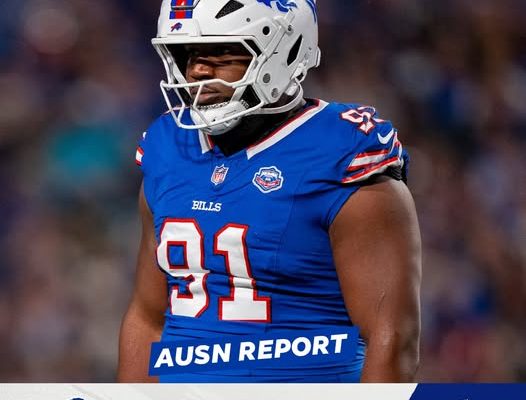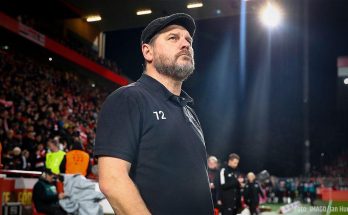The Buffalo Bills will be without one of their most important defensive playmakers this weekend, as star defensive tackle Ed Oliver has officially been ruled out for Sunday’s game. This news is a significant development for Buffalo’s defensive unit, as Oliver has been one of the most consistent and disruptive forces on the line since being drafted in the first round out of Houston in 2019. His absence will not only impact the Bills’ ability to pressure the quarterback but will also have serious implications for their run defense and overall defensive game plan. When a player of Oliver’s caliber is sidelined, the ripple effects are felt throughout the roster, from the defensive line rotation to the linebacking corps, and even in how the secondary approaches coverage.
Ed Oliver has steadily grown into one of the anchors of Buffalo’s defensive identity. Known for his combination of speed, strength, and explosive first-step quickness, Oliver often draws double teams from opposing offensive lines, freeing up teammates to make plays. His ability to collapse the pocket has been a key element in Buffalo’s defensive scheme, as he forces quarterbacks off their rhythm and disrupts passing lanes. Without him, the Bills lose a critical interior presence, making it much more challenging to contain both the run and pass. In today’s NFL, where disruptive defensive tackles can change the outcome of games, Oliver’s absence cannot be understated.
The timing of this injury could not be worse for Buffalo. Early-season games are crucial in setting the tone for the year, and every win or loss can affect playoff seeding down the road. Facing Sunday’s opponent without Oliver creates a daunting challenge for the Bills’ coaching staff, who now have to rework their defensive rotation to account for the missing Pro Bowl-level talent. Opposing offensive coordinators will likely waste no time adjusting their schemes to exploit Oliver’s absence, particularly by targeting the middle of Buffalo’s defensive front. Running backs may find more room to operate, and quarterbacks may have extra time to survey the field without Oliver’s relentless push.
Defensive coordinator Leslie Frazier has long relied on Oliver’s versatility. While Oliver’s primary role is to penetrate gaps and generate interior pressure, he also plays an integral role in setting the tone for Buffalo’s defense. His motor and intensity energize teammates, and he often sets the tone early by blowing up run plays or forcing hurried throws. Replacing that kind of presence is not as simple as plugging in a backup. Depth will be tested, and players who normally rotate in sparingly will now have to take on expanded roles.
The most immediate question becomes: who will step up in Oliver’s place? Buffalo has some talent on the defensive line, including DaQuan Jones, Jordan Phillips, Tim Settle, and younger players waiting for opportunities. Jones, a reliable veteran, will likely take on more snaps and shoulder the bulk of interior responsibilities. Phillips and Settle, both capable of making plays, will need to bring consistency that has sometimes been missing in their performances. This game becomes a proving ground for Buffalo’s depth, as they must collectively fill the void left by Oliver’s absence.
From a strategic standpoint, the Bills may also need to adjust their approach. With Oliver out, Frazier may lean more heavily on blitz packages to generate pressure. Linebackers such as Matt Milano and Terrel Bernard could be tasked with attacking the quarterback more frequently, helping compensate for the reduced push up front. This, however, carries risks. Blitzing more often leaves the secondary vulnerable, especially against offenses with quick passing schemes designed to exploit aggressive defenses. The Bills’ defensive backs, including Tre’Davious White, Taron Johnson, and Jordan Poyer, may find themselves under greater pressure to lock down receivers without as much help from a collapsing pocket.
Oliver’s injury also highlights a broader issue: the physical toll of the NFL and the importance of depth. Every team prepares for injuries, but losing a star player tests the resilience of a roster. For Buffalo, this situation emphasizes the need for younger defensive linemen to develop quickly and seize opportunities when they arise. The NFL season is long, and depth often determines which teams survive the grind and which fall short of expectations.
On the offensive side of the ball, Oliver’s absence could indirectly impact Buffalo as well. With a potentially less dominant defense, Josh Allen and the offense may feel added pressure to score more points to keep pace. The margin for error shrinks, and every possession becomes more critical. Allen has proven capable of carrying the team when needed, but asking the offense to consistently cover for defensive shortcomings is not a sustainable formula over a 17-game season. The Bills thrive when their defense complements their explosive offense, creating balance and momentum. Losing Oliver disrupts that balance, at least temporarily.
For the opponent, this development is welcome news. Offensive coordinators game-planning for Buffalo now have more flexibility. Expect to see more runs between the tackles and play-action plays designed to exploit Buffalo’s interior defense. Without Oliver commanding double teams, opposing guards and centers can focus more on sealing off lanes and keeping their quarterback upright. Running backs may find themselves breaking through the first line of defense more easily, putting extra stress on Buffalo’s linebackers and safeties.
Beyond the Xs and Os, Oliver’s absence carries an emotional weight. Leaders like Oliver inspire confidence in teammates. When he takes the field, others play with greater energy knowing they have a game-wrecker in the trenches. His injury may deflate some of that momentum, at least initially. The coaching staff will need to rally the team and emphasize a “next man up” mentality, ensuring that morale and intensity remain high. In the NFL, the difference between winning and losing often comes down to mindset as much as execution.
Looking ahead, the question also arises about Oliver’s long-term health. Is this a short-term setback or something that could linger into future games? The Bills have championship aspirations, and their path to the Super Bowl will be significantly harder without a healthy Oliver. The team’s medical staff will play a critical role in ensuring that he recovers fully before returning to action. Rushing him back too soon could risk further injury, but the urgency of the season will make it a delicate balancing act.
Oliver’s absence also serves as a reminder of just how valuable interior defensive linemen have become in today’s NFL. While edge rushers often get the spotlight for sacking quarterbacks, it is players like Oliver—those who can dominate inside—that often determine the success of a defense. By pushing the pocket and eliminating step-up lanes for quarterbacks, players like Oliver make life easier for everyone around them. The Bills’ defense has been one of the league’s most feared units in large part because of Oliver’s contributions.
For fans, Sunday’s game now comes with a sense of uncertainty. The Bills are known for their stout defense, but without Oliver, there is no guarantee they can maintain the same dominance. Supporters will be watching closely to see how the team responds, who emerges as a difference-maker, and whether the defense can hold strong against an opponent looking to exploit its weakness. The outcome of this game will not only affect Buffalo’s record but also provide insight into how resilient this team truly is.
If the Bills manage to win without Oliver, it will demonstrate the depth and adaptability of their roster, boosting confidence for the weeks ahead. If they struggle, however, it will underscore just how vital Oliver is to their success and may raise concerns about the defense’s ability to handle elite competition without him. Either way, Sunday’s contest becomes a litmus test for Buffalo’s identity and resilience.
In conclusion, Ed Oliver being ruled out for Sunday is a major blow to the Buffalo Bills. His absence affects the defensive line, the overall game plan, and the confidence of the entire team. Yet, it also presents an opportunity—an opportunity for other players to step up, for the coaching staff to get creative, and for the Bills to prove they can overcome adversity. Football is a game of attrition, and champions are often defined not by the stars they have on the field but by how they respond when those stars are missing. The Bills’ response to Oliver’s injury will tell us a lot about their championship mettle this season.
For now, the scarlet reality is clear: Buffalo will be without one of its best defenders this Sunday. The road just got tougher, the challenges steeper, and the stakes higher. But if there is one thing the NFL has shown time and time again, it is that adversity breeds opportunity. And the Buffalo Bills, with their eyes set on the Super Bowl, must seize this moment and rise above the absence of Ed Oliver.



